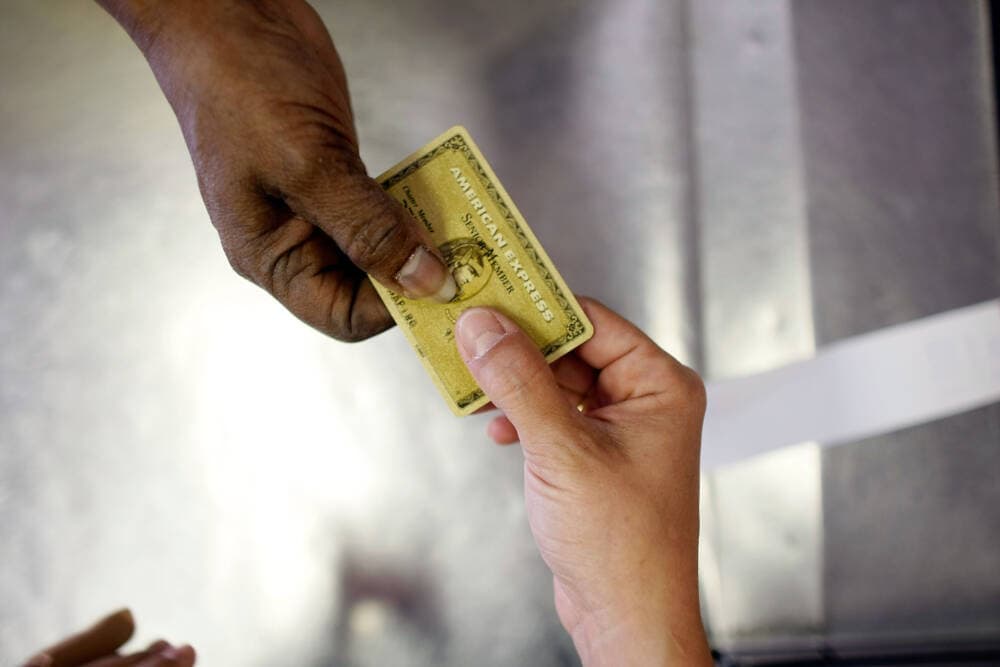Advertisement
Credit card questions: 'Don't judge why other people go into debt,' expert says
Resume
Card debt is at a record high. More Americans are upside down on their car loans than ever.
From the rising costs of just about everything to layoffs or wages that just don't cover the bills, there's a number of reasons why people are racking up debt, says Jill Schlesinger, a CBS News business analyst and host of “Jill on Money.”
“During the pandemic, we saved a lot of money. And then as we started to see the economy open up, a lot of those savings were spent,” she says. “People then were spending on things they really needed — goods, things like cars — to get to work. Services started to cost more and we ate through our savings. And many people actually ended up borrowing money either through a credit card, or an auto loan, or personal loan, to finance some of their post-pandemic lives.”
One way to address the stigma around debt is to talk about it and, Schlesinger says, make sure people understand the terms under which they are borrowing money.
“I do think it would be better for us as a society to not judge why other people get into debt,” she says. “Sure, it would be great for us to all … live within our means. That's wonderful. But life happens and it's usually not that someone's really done something stupid. It's really that something bad has happened to that person. And this was the only alternative.”
Schlesinger takes questions that Here & Now listeners have shared about paying down debt.
5 debt questions from Here & Now listeners:
Question from Joseph Cole in Las Vegas, Nevada: “My wife and I were in credit card debt for several years before we decided to declare bankruptcy and get rid of the nearly $90,000 we had in credit card, auto loan and other unsecured debts. We're looking to buy a house in the next 18 months, and it's been about a year since our loans were dissolved through the bankruptcy. I'm just asking what would our next steps be, to help our credit recover post-bankruptcy to make the homebuying experience as smooth as possible and to open up any opportunities we may not have if we don't start that process now.”
Schlesinger: “Yeah, I don't think it's going to happen in a year unless there's a lot of family help or money coming from another source because it's going to be hard to qualify for a mortgage. So one of the ways that you can restore your credit worthiness is to use something called a secured credit card. It's sort of like a prepaid credit card. Essentially, you give the company $500, they send you a credit card. And it just sort of credits against this bill.
“The reality is that it seems like a little bit of theatrics to show that you can give them $500 upfront and then pay your bills. But the reality is it is a way to create a credit record. Debit cards don't do it. And unless there is another installment loan out there, this is one of the quicker ways to start to get your credit build up. I would not actually suspect that they will be able to qualify for an affordable mortgage rate for another three years.”
Question from Eryn Bennett in Irvine, California, who has just under $10,000 in credit card debt that she's built up over the last two years of traveling after the pandemic:
“My biggest question is, if I have opened credit cards in the past and I don't necessarily use them all the time, is it bad on my credit to have open trade lines — I think they call it — without activity or with zero balances? Does that look bad?”
Schlesinger: “The weird thing is the way your credit score is actually determined, it is not so much how much credit that you have outstanding, but it's also the amount of credit you could tap into and what percentage of that credit you are using, the availability of that credit.
“Now, in Eryn’s case, don't close out any of your credit cards. You can stick these cards in the back of a drawer. You don't need to have any activity on them. When you actually close down your credit cards and cancel them, it can actually work against your credit score. So you can have them. Don't use them and don't close them until you have restored the credit card balances to zero and then figure out the ones you want to use. You can cut them up, but don't worry about canceling them.”
Question from Victoria Yee in Oakland, California, who says she has more than $18,000 in credit card debt and has been working on paying it down for the last ten years or so:
“My question is, I'm right now in a battle with a certain department store company regarding late fees and interest that they charged me because they didn't see a bunch of payments I made and they're refusing to reimburse those fees. Who can I contact to try and get them to take the fees away? Or at least work with me because they're being very stubborn about it.”
Schlesinger: “First of all, they're difficult. And she's doing the first, most important thing, which is contacting the vendor themselves and saying, can you release this? Can you not? Now, if they're not going to, and she's going to the Better Business Bureau, that's possible.
“I would also try something called the National Consumer Assistance Plan. It was launched in 2015 and it was a way to actually have any credit reporting disputes adjudicated. And the three credit reporting companies usually will have stricter rules about the accuracy of the data that they collect. So I would try that. It may actually be helpful. And of course, annoyingly, just persistence is probably going to be the best thing that she can do.”
Question from Carla Parsons in Harrington, Maine, who is carrying $50,000 in medical-related credit card debt because she's had to pay out of pocket for two expensive surgeries for her adult daughter after an accident:
“If we are able to bail out banks, why can't we instill a cap on credit card interest rates? At the very least, why not instill a cap on interest rates charged for medical expenses?”
Schlesinger: “I think that would be a wonderful idea. I actually think that the bigger issue is that all of the structure of credit card debt has really felt the pressure of the lobbying effort of these companies. And, I thought that maybe after the financial crisis in 2008, 2009, that the Consumer Financial Protection Bureau would sort of take that up. But, part of the problem of the Consumer Financial Protection Bureau in this iteration and where we are now a decade on since that started, is that it has somewhat been watered down a bit.
“There is no answer for Carla except to say that there is perhaps a possibility that she might explore talking to an attorney, because — like our first listener who said that they declared bankruptcy and they had all their debt released — sometimes the bankruptcy courts are actually a good place to go. The issue really is what else you have to lose if you go that route.”
Question from Vincent DeGruy of Fort Worth, Texas, who has more than $25,000 in credit card debt. He's been working to pay it down for 20 years:
“Setting aside moral arguments about the righteousness of paying your debts. Realistically, looking at the dollars and I have to choose every week whether to spend my money on retirement or spend it on paying off debt. Why should I pay off all that debt? Instead of just claiming bankruptcy?”
Schlesinger: “I think this is sort of like the Carla question before, which is, I think that we make terrible moral judgments about people. Businesses do this all the time. They declare bankruptcy to release the pressure on the business. We don't allow that for individuals. This is what the bankruptcy court is actually for, which is to say, I can't get out from under this $25,000 credit card debt.
“I would actually talk to a bankruptcy attorney and see what your options are. There's a process. It's not fun to go through bankruptcy because as we heard earlier, when you go through bankruptcy, you can't get credit. But, presuming you don't need it to borrow money, bankruptcy might be a good option for you.”
Ashley Locke produced and edited this interview for broadcast with Catherine Welch. Locke also adapted it for the web.
This segment aired on April 17, 2023.

